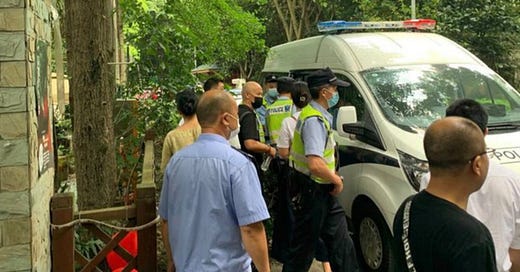This month is the 6th anniversary of the attack and forcible closure of Early Rain Church in Chengdu, Sichuan, China, and the arrest of Pastor Wang Yi, who is about to spend his seventh consecutive Christmas in prison.
Two weeks ago I posted (and podcasted) the Wang Yi Family Newsletter that was published just 12 days before his arrest on December 9, 2018. Last week I shared (also via podcast) a handful of updates that were put out by unnamed Early Rain Church members in the immediate aftermath of the attack and arrest of the pastor and most of the church leadership.
As one of last week's updates reminded us, there was no guarantee that the next update would ever come. Arrests were ongoing. So it was an encouraging answer to prayer when a number of testimonies from prison were released on Dec 15th, 2018.
I remember well receiving these updates (almost) live and sharing them with Christians in Oklahoma at the time. The following stories (listen to the podcast here) brought me to tears, especially the reality that God was using this attack to further His Kingdom behind prison doors (including a notoriously-hard-to-reach Tibetan):
Early Rain Urgent Prayer Update (12/15/18)
According to some testimonies of brothers and sisters that have emerged, they have been sharing the gospel while under guard. They have been using their suffering as a beautiful testimony for the Lord. Some police officers and workers have been very interested in the gospel, even giving their addresses and asking for Bibles.1 May the Lord choose for himself children from among these law enforcement officers persecuting the church.
Another encouraging testimony about what God is doing behind prison walls. This extended quote is from a church member who was just released from 10 days of detention:
“It is like a monastery in there. I cultivated myself for ten days there.2 Thank God for his protection. I often shared the gospel in there. There was a Tibetan named Z3 who really wanted to hear preaching, to join a small group, and to become a Christian.4 There was also a master’s student who has been quite miserable since entering [the detention center]. He wanted to buy a Bible, and I told him I would give him one. He also wanted to attend a small group Bible study. There was also another person who used to belong to a traditional house church but who stumbled because of marriage problems. I am preparing to give him one of our church’s thumb drives so he can listen to preaching. . . the despair of the prisoners inside [this high security prison] is also quite high, making evangelizing more fruitful. Thank the Lord!”
Lord, the greatest freedom in the world is the freedom of becoming your children. You say that we will know the truth, and the truth will set us free. May your Spirit fill us and make us to worship freely, to enter prison freely, to spread the gospel freely. Give us free and noble hearts. Turn us into liberated criminals5 willing to be detained by the world. For a servant is not greater than his master. If they persecuted you, they will persecute us.
We also ask you to forgive them, for they do not know what they are doing. Open their eyes to see your glory and turn them into free children!
In the cross, in the cross
Be my glory ever;
All our sins are washed away
Only by His blood.6
This is not as far-fetched as it sounds. Not all persons in authority in China are hard-core atheists or anti-Christians. Some are genuinely curious, especially when they see church folks rejoicing and singing while being unjustly arrested and interrogated for their faith.
I think by “cultivated” he is simply referring to spending time examining his/her own heart, and focusing on prayer and meditation on God’s Word.
“Z” is short for whatever full Tibetan name this person had. It is unclear if the writer left it out to protect that particular person, or if the name was too difficult to pronounce or remember. There are a number of common Tibetan names that begin with “Z”.
The apparent spiritual curiosity (conviction) of this particular Tibetan man is remarkable (and particularly what brought me to tears when I first read this six years ago), as Tibetans are infamous for their difficulty in being won to Christ, and understanding the Gospel.
This whole section is a fascinating and beautiful picture of the Gospel. The Christians are in “chains”, but are eternally free in Christ. The Communists are physically free, but condemned and chained in sin. The Christians realize this and pray that their captors and enemies would be freed from the chains of sin and turned into free children of God as well!
Each one of these major updates seems to end with a prayer and a song. I do not know where the lyrics come from. They are probably portions of Chinese hymns that would be easily recognized and remembered by the church members.




